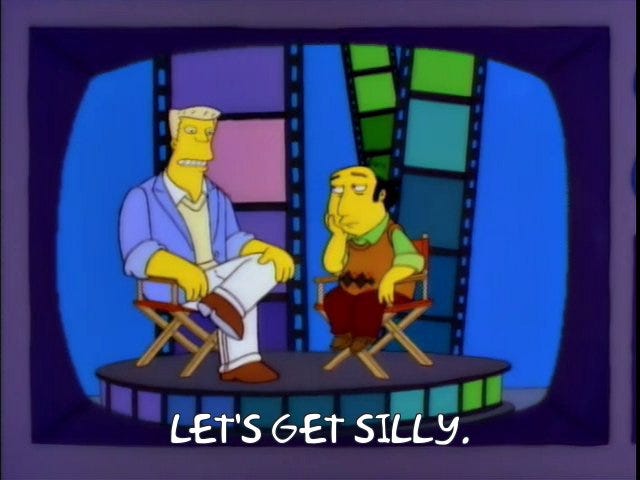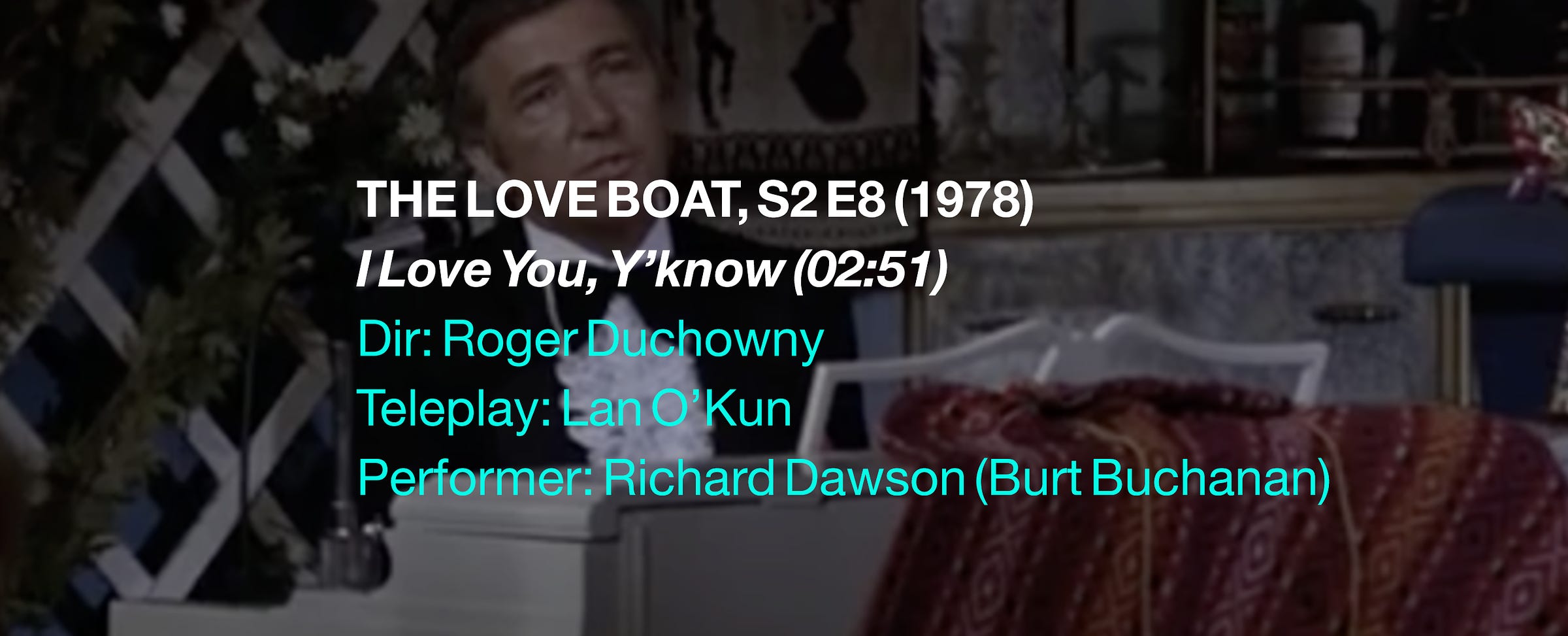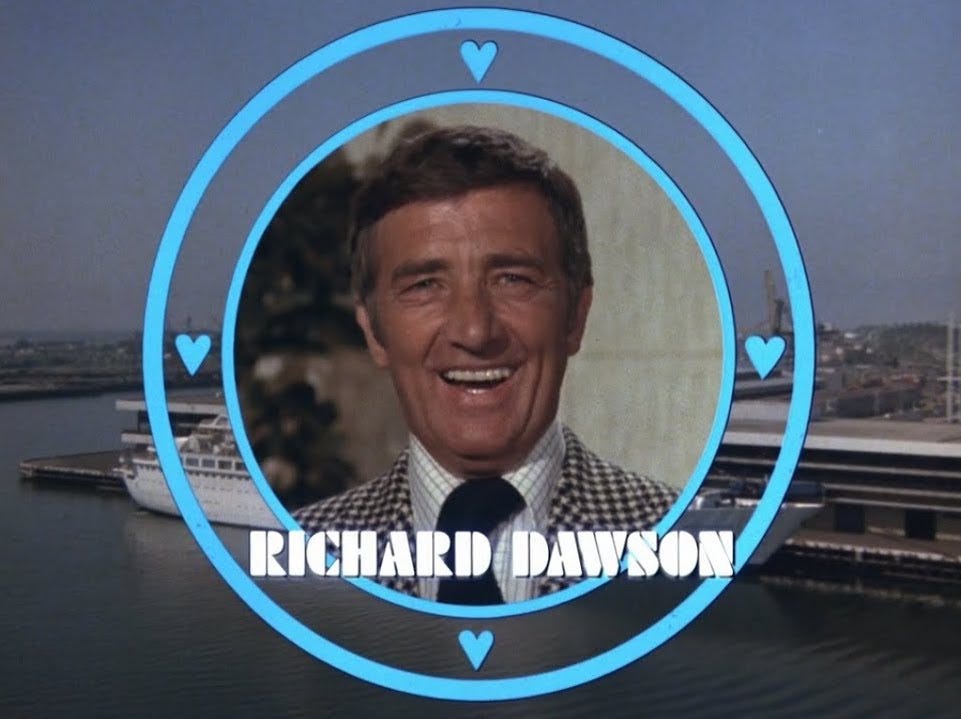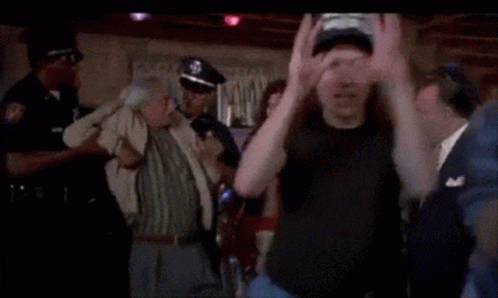This was written during the 2023 WGA and SAG/AFTRA strikes. The work covered here would not exist without the labor of the writers and actors currently striking for improved working conditions and fair pay.
::
Friends, I’m positively grappling with the long-read I’d planned for this week, so while I plan to return to more serious fare next week, for now …
In his 1930 comedy of manners, Private Lives, Noël Coward cannily wrote that “It’s extraordinary how potent cheap music is.” While unearthing this universal truth that can be applied nearly end-to-end across the century of indispensable pop music since then, Coward can’t have known his big-tent summation would also include a season two episode of The Love Boat, but I was as surprised as you to find it applied.
Some context: among the categories we’ve sorted our TV viewing into (main watch, dishwashing watch, etc.), my wife and I have included the Fall Asleep Show - preferably something familiar, something we won’t mind falling asleep during, and better still, something with a comfy old rhythm to lull us to sleep.1
This week, that dubious honor has fallen to The Love Boat, Aaron Spelling’s passive infomercial for Princess Cruises. And hey, it’s 2023, you don’t need me coming through to dunk on a show that’s been off the air for 35 years, so I’ll lead with praise:
Without being self-conscious or ironic, The Love Boat knows exactly what it is - a bit of escapist, VD-and-norovirus-free fluff; a sandbox for ABC’s roster of talent to guest star; and an ode to clean, safe-for-all-time-zones missionary horniness. As such, it lives up to its brief, never trying to push too far beyond its comfort zone, or that of its audience.
So now that we’ve established the “cheap,” let’s get to the “potent.”
Eight episodes into the show’s second season comes the 90-minute special episode “A Time for Everything/The Song Is Ended/Accidental Cruise/Anoushka”2, and friends, for a show whose central feature is its hella-70s guest cast, this one has an absolute murderer’s row, namely Robert Goulet, Juliet Mills, Soupy Sales, Loretta Swit, Joanne Worley, and Richard Dawson.
Let’s brush past three of the plots3 and zero in on The Song Is Ended, which finds long-married couple Goulet and Mills running into Dawson, their old college buddy, aboard the Princess. Years earlier at Syracuse University, Dawson and Goulet were a popular songwriting team; after college, Dawson parlayed his songwriting talent into multi-hyphenate fame while Goulet and co-ed Mills married and began a quiet family life in Philadelphia.
Goulet and Mills’s marriage has hit a cold patch, though in trying to be even-handed about it, the writing appears to flip the motivations between characters, almost as though Goulet’s role was overwritten, so they decided to give half his dialogue to Mills, and if you’re thinking this is too much thought to put into a 45 year old episode of The Love Boat, I both agree with you and remind you which newsletter you’re reading.
Dawson’s coincidental travel plans bring Goulet and Mills’s cooling marriage into sharp relief, both in terms of Dawson’s outsized success4, and for the fact that he, Goulet and Mills formed an unrequited love triangle in college, the unfinished business of which is spilling all over the Fiesta Deck.
The climax of the story comes when Dawson performs “I Love You, Y’Know,” a shabby but articulate torch song pointed at Mills, confirming first for the crowd that it’s one of Goulet’s compositions, saying the things Goulet hasn’t been able to say to Mills over the course of their marriage.5 Mills is moved to tears, she and Goulet rekindle, and a coda tells us that they’re going to make an effort to reunite with Dawson more frequently.
So far, so garden-variety for Love Boat, but I couldn’t shake the surprising effectiveness of the pivotal, Goulet-character-penned torch song. 6
My assumption was that Spelling and Co. had tapped an established songwriting team for this and Goulet/Dawson’s mid-show composition (google it if you have to, but it’s genuinely awful in concept and execution, no matter what Lauren Tewes’s enchanted grin tries to communicate to us), but was surprised to learn that both were the work of series writers Ray Jessel and Lynne Farr.
And look, yes, I was high and falling asleep the first time7 I heard the song, and that’ll affect how it hits, but sung in Dawson’s hushed, baritone mumble, the song falls somewhere between Watertown-era Sinatra and Rowlf the Dog’s Muppet Movie lounge blues, taking on a kind of bruised dignity.
The clearinghouse, book-who’s-available toy chest of The Love Boat is as much a weakness as a strength8 - it stands to reason that when you’re trying to fill 43 (or in the case of this ep, 90) minutes a week, you empty your pockets and use what you’ve got.
Some of it’s gonna be Hot Lips Houlihan in a doomed romance with a lothario in coke-bottle-glasses or Gavin MacLeod staring into the middle-distance while flashback waves wipe the camera.
But statistically, the stopped-clock logic of it all dictates that every so often, even by accident, you get a gem. And if you can peel away the asterisks and take it at face value, the cheapness can still pack some potency.
AG.
NOTE: All images and music are the property of their copyright-holders. No ownership implied.
Look, I get that this isn’t the outcome that writers, producers, directors, and casts had in mind when they made an episode of TV decades ago, but neither did the Almighty intend for the awesome movement of the seas or the mighty clap of thunder to be reduced to a Nature Sound YT clip for you to nod off to, so let’s call it square.
Episodes typically were comprised of three plot-lines, each with its own writing and directing team.
A Time for Everything, a melodrama centered around Capt. Stubing (Gavin MacLeod) discovering he has a daughter (eventual series regular Jill Whelan) by a recently-deceased flame
Accidental Cruise, where coworkers Sales and Worley, drunk from an office party, stow away on the Pacific Princess before falling in love, and
Anoushka, a folie-a-deux between ship’s doctor Adam Bricker (Bernie Koppell) and a visiting Russian commissar (Swit) getting blasted on vodka and falling for each other
Dawson plays Burt Buchanan, who appears to have Sinatra’s level of success, even while his name and former partnership with Goulet’s Charlie Godwin suggests Burt Bacharach.
The writing hasn’t really supported this up until now, but it’s a logical conclusion, even if it’s one for a more cleanly-told story.
Of note: I’m the easiest of marks for this on a few fronts:
Lost/niche curiosities
Celebrity novelty songs
Schmaltz
Yes, there have been a second and third time
A later episode makes scene partners of Janet Leigh and Conrad Bain and, no shade on Mr. Drummond, but he’s not a movie star and she is, and Leigh’s command of gesture, mannerism and general sense of how to play for a camera run circles around Bain.







